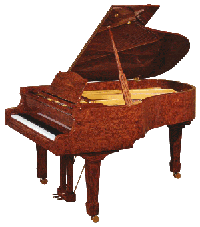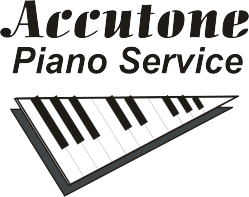 Cleaning: Cleaning the inside of a piano, especially a grand piano, is not as mysterious as it may seem. Most parts of a piano are rugged, and you need not worry about hurting anything EXCEPT DAMPERS in a grand piano. The dampers are those black things that rest on top of the strings, and that move when you press the damper pedal. Be careful not to snag them with a cleaning rag.
Cleaning: Cleaning the inside of a piano, especially a grand piano, is not as mysterious as it may seem. Most parts of a piano are rugged, and you need not worry about hurting anything EXCEPT DAMPERS in a grand piano. The dampers are those black things that rest on top of the strings, and that move when you press the damper pedal. Be careful not to snag them with a cleaning rag.
Vacuum: To remove excess dust under the strings, use a hair dryer (Heat OFF!) to blow dust into the left corner where you can vacuum it up or pick it up with a dusting cloth. Dust sticking to the board under the strings can be removed with special equipment, and this is best done by your technician. People ask, “Is it better to close up the piano to prevent dust from entering?” My answer is, dust is like air. You can’t avoid it. Up or down doesn’t really matter, it’s up to you.
Keys: Cleaning the keys is best done with some mild cleaner applied with a soft cloth (NEVER SPRAY ANYTHING ON THE KEYS). If your piano has ivory keys, and they are badly soiled, use “Softscrub” or other mild abrasive cleaner. Be sure to dry the keys thoroughly afterwards.
Brass: If the brass hardware on the piano is tarnished, I recommend “Brite Boy” brass cleaner. Note that many brass parts are coated with a plastic or lacquer coating to prevent premature tarnishing. After some time, the brass may become tarnished in tiny spots which grow larger in time. The coating must be first removed before the brass can be cleaned and polished. “Flitz”, a polishing cream, is a good choice for stubborn tarnish, as well as Brasso. If you have a high polish finish, Brasso may leave a dull finish and residue, so avoid Brasso if you have this type of finish .
Spills: Be sure not to allow anything to fall inside of your piano, especially anything wet. If anything spills inside, try to mop it up as soon as possible. Call a technician immediately to have the piano inspected for damage. Time is critical here, and long term damage may be avoided by immediate servicing of the piano. Don’t touch the strings, especially the bass strings, since finger oils will tarnish the strings, .leaving discolored spots on them.



